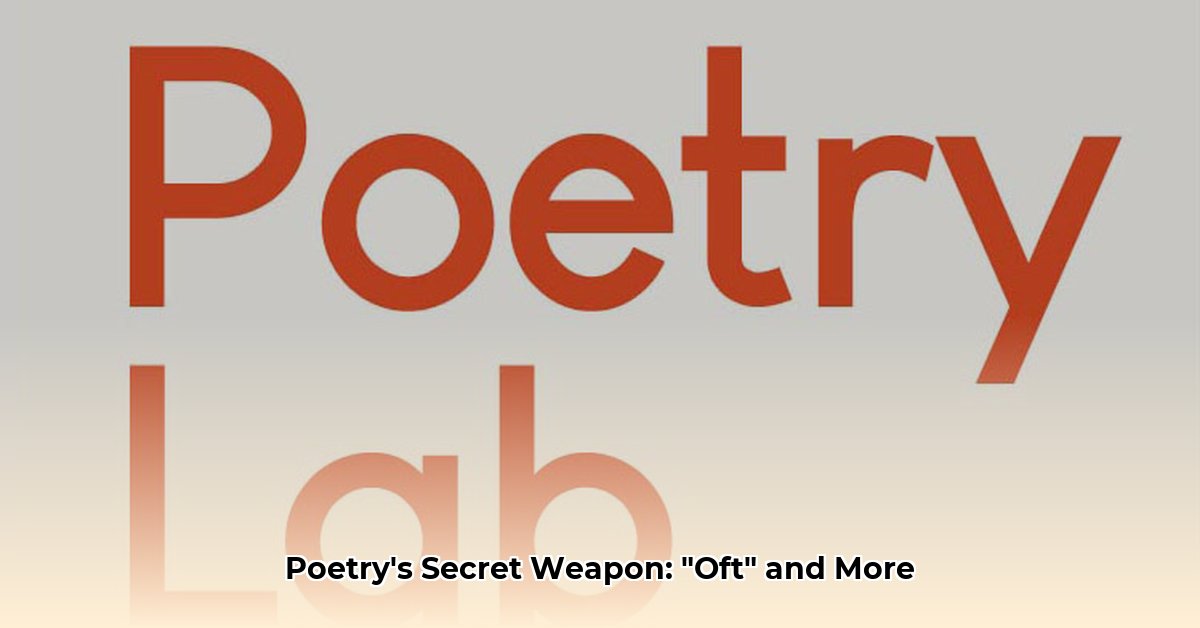Stuck on a crossword? Dreaming of crafting evocative verse? Words like “oft” and other poetic staples hold the key to both. This guide unlocks their secrets, offering a quick-reference for crossword solvers and a deep dive into poetic language for aspiring poets and curious minds.
Decoding Poetic Vocabulary
Is your crossword hinting at a word “frequently found in poetry”? “Oft” is a likely candidate. Its brevity makes it ideal for crosswords. “Often” is another possibility, though perhaps less common in verse. “Oftentimes” is less probable but worth considering depending on the crossword’s difficulty.
For poets, relying solely on “frequently” can feel uninspired. Poetry thrives on rich language. “Oftentimes” lends a formal tone, while “anon” evokes a bygone era. “Many a time” resonates with ballad-like rhythm. Experiment to find the perfect fit for your poem’s voice.
| Word | Meaning/Effect | Example |
|---|---|---|
| Oft | Frequently (archaic) | “Oft in the stilly night…” (Edgar Allan Poe) |
| Oftentimes | Frequently (formal) | “Oftentimes I trod the enchanted ground…” |
| Anon | Soon (archaic, mysterious) | “Anon, the raven spoke…” |
| Many a time | Frequently (repetitive) | “Many a time I’ve wandered through this wood” |
Beyond individual words, poetic devices like alliteration (repeating consonant sounds) and assonance (repeating vowel sounds) weave musicality into verse. Repetition intensifies emotion, as in Poe’s “Nevermore.” Even subtle echoes, like the “o” in “oft” and “often,” add depth and complexity.
Exploring “Oft,” “Ofttimes,” and Other Archaic Terms
These words, rarely used in conversation, add a unique flavor to poetry. “Oft” simply means “often,” but carries a nostalgic charm, a touch of formality. “Ofttimes,” also meaning “often,” emphasizes regularity, suggesting repeated occurrences.
Other archaic gems enrich poetic language: “ere” (before) adds romance and mystery; “thence” (from that place/time) suggests a journey; “whence” (from what place/source) questions origins.
| Word | Meaning | Example |
|---|---|---|
| Oft | Often | The knight oft rode through the dark forest. |
| Ofttimes | Often, regularly | Ofttimes, the villagers gathered by the fire. |
| Ere | Before | Ere the sun sets, we must make haste. |
| Thence | From that place/time | Thence, they journeyed to the distant land. |
| Whence | From what place/source | Whence came this mysterious stranger? |
| Afore | Before | Afore I go, I have something to tell you. |
| Anon | Soon, shortly | I shall return anon. |
| Betwixt | Between | The treasure lies betwixt the two oak trees. |
Use these words thoughtfully. Consider their impact on tone and meaning. Do they enhance or distract? Reading aloud can help assess their natural flow.
Why do some archaic words persist? They may offer a connection to the past, a resonance with tradition. Their beauty or timelessness may also contribute to their survival.
Crafting Poetic Music: Alliteration, Assonance, and Meter
These sound devices are fundamental tools for shaping poetic expression.
Alliteration: The Consonant Chorus
This repetition of consonant sounds, especially at the beginning of words or stressed syllables, adds musicality and emphasis. From “Peter Piper” to “slippery slope,” alliteration creates memorable sonic textures.
Assonance: Vowel Harmony
The repetition of vowel sounds within words creates an internal rhyme, linking words and evoking emotion. The echoing vowels in “The rain in Spain falls mainly on the plain” create a sense of atmosphere. Subtle or pronounced, assonance shapes the poem’s feel.
Meter: The Poem’s Pulse
Meter is the rhythmic pattern of stressed and unstressed syllables, the heartbeat of a poem. Metrical “feet” (iambs, trochees, spondees, anapests, dactyls) create different rhythmic effects. The number of feet per line further defines the meter (e.g., iambic pentameter).
These devices are not mere decoration; they are tools for crafting meaning. Alliteration mimics sounds, assonance creates mood, meter sets the tone. Their interplay weaves a tapestry of sound and sense. Ongoing research explores their subtle effects, suggesting that meter, for example, may tap into our innate sense of rhythm, influencing our emotional response.
The Essence of Poetic Language
What makes poetry poetic? It’s a blend of carefully chosen words (including archaic gems), the music of sound devices, figurative language (metaphors, similes, personification), and form and structure. It’s a delicate balance, an art of using these tools to evoke emotion and create a unique experience. There’s no single formula, and the art of poetry continually evolves.
Embracing Poetic Potential
“Oft” and its poetic companions are more than just crossword fodder. They are tools for crafting powerful and evocative language. Whether deciphering clues or composing verses, understanding these words and devices unlocks a world of expression. Explore their nuances, experiment with their possibilities, and discover the magic they hold. The evolution of poetic language continues, offering an endless frontier for discovery and innovation.
- Cool Apps for Android Tablet for Creativity, Fun, and Productivity - February 13, 2026
- Must-Have Great Apps for Tablets to Get More Done - February 12, 2026
- Best Android Apps to Buy That Are Worth the Money - February 11, 2026










